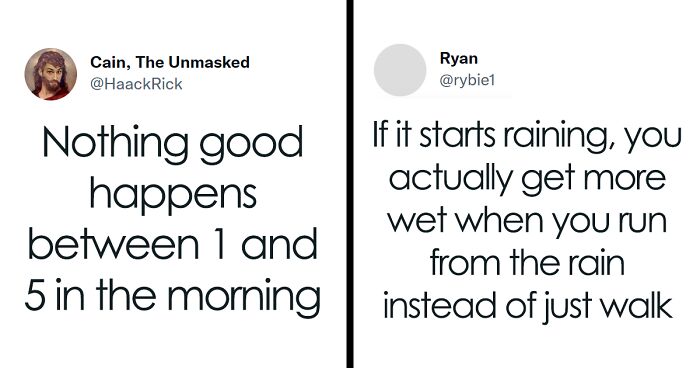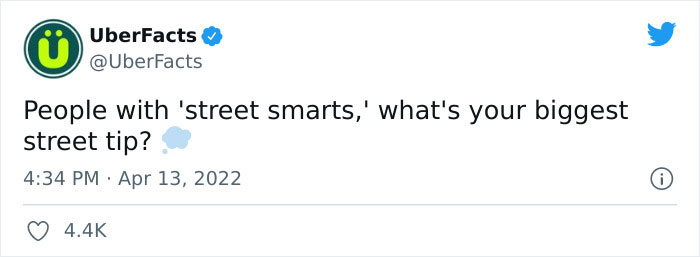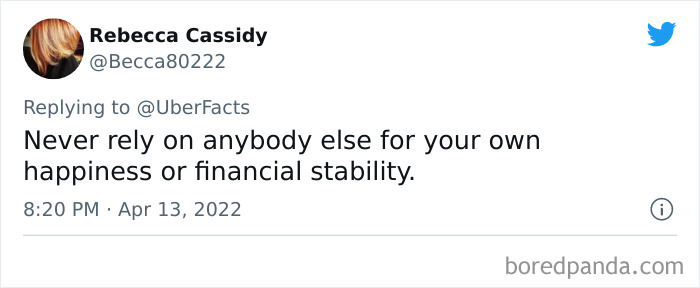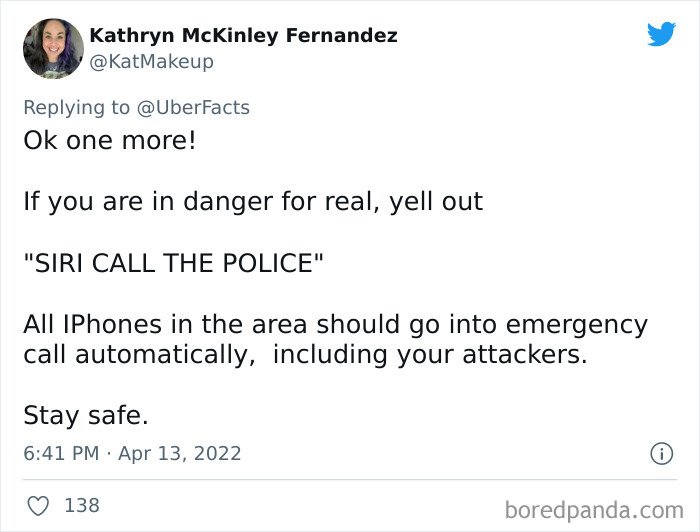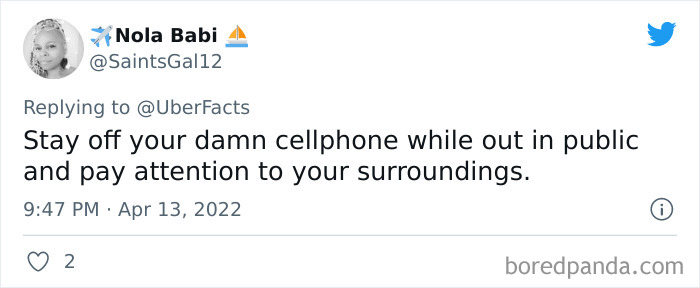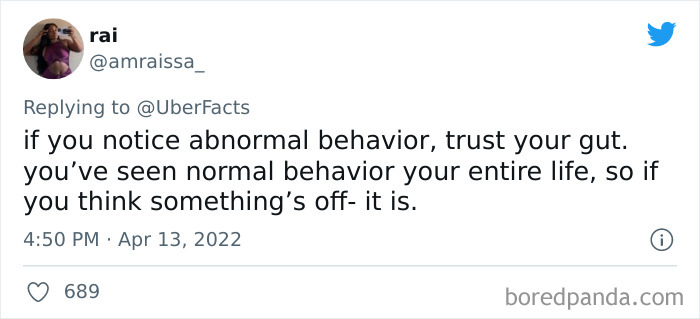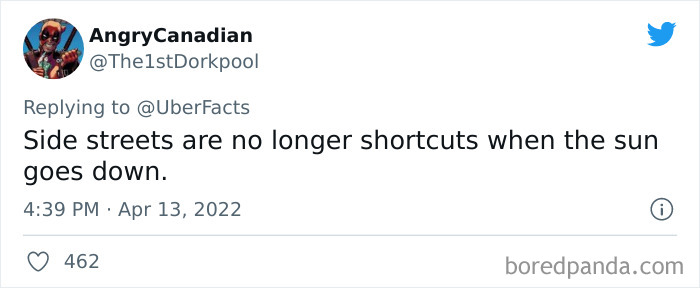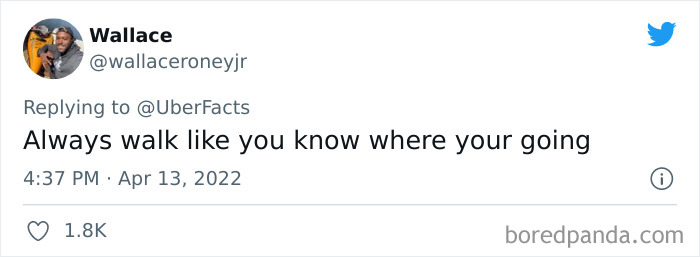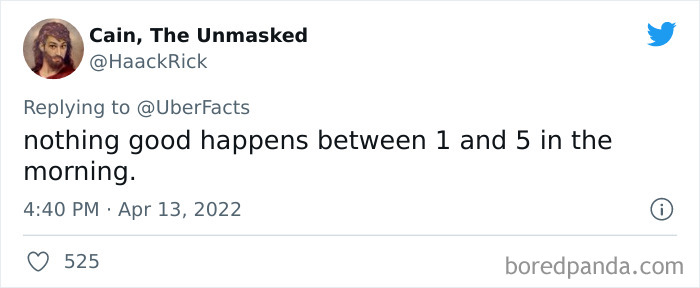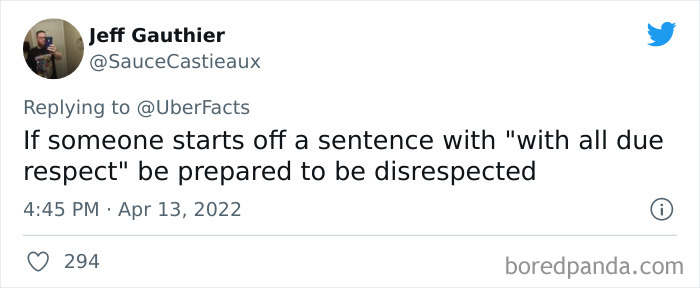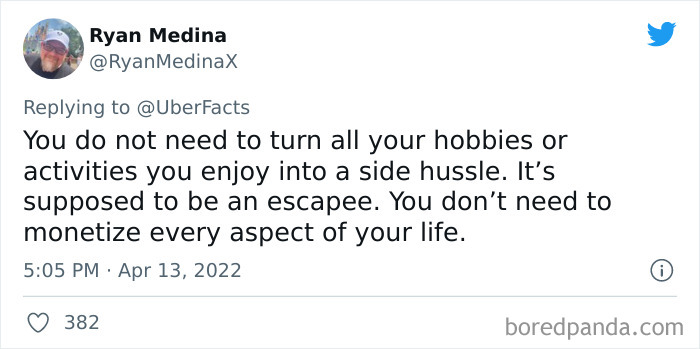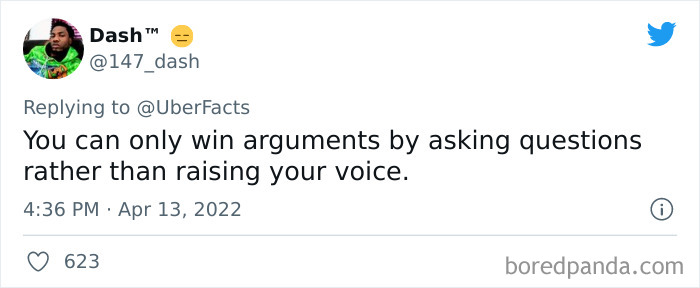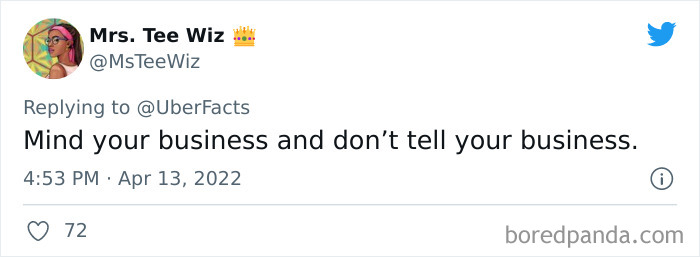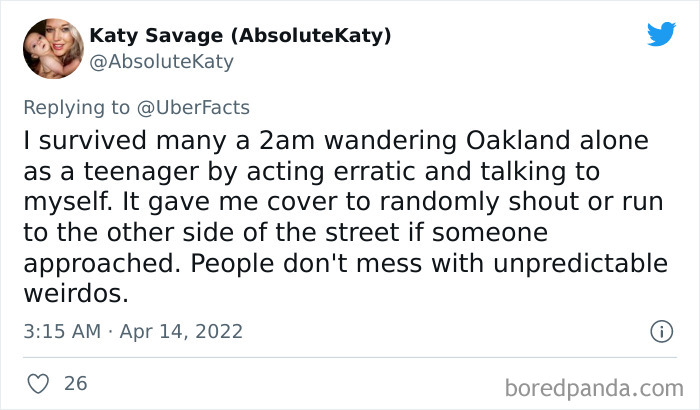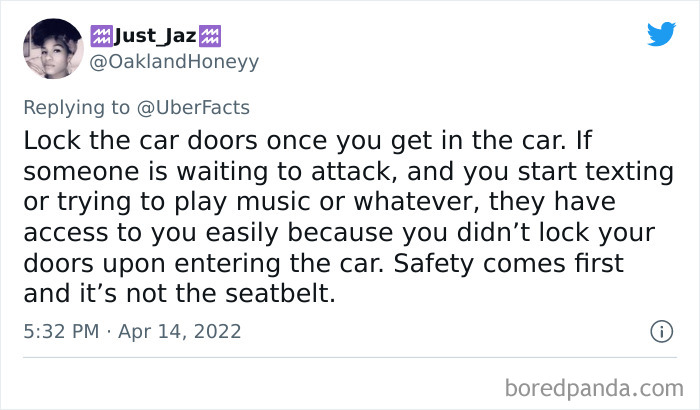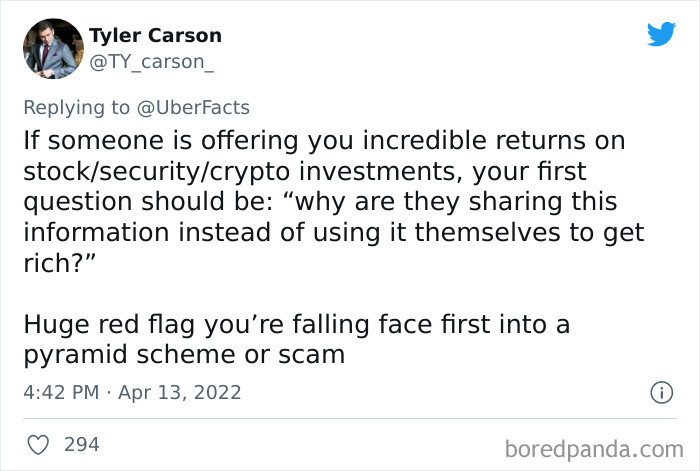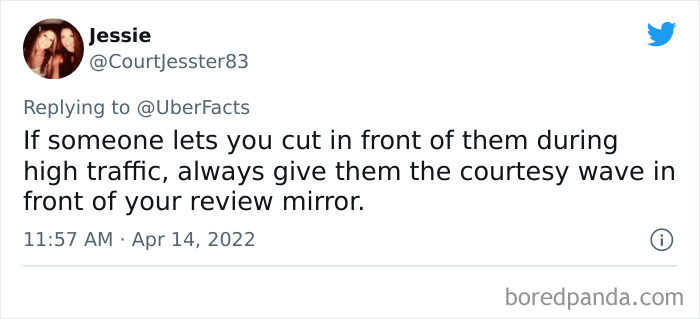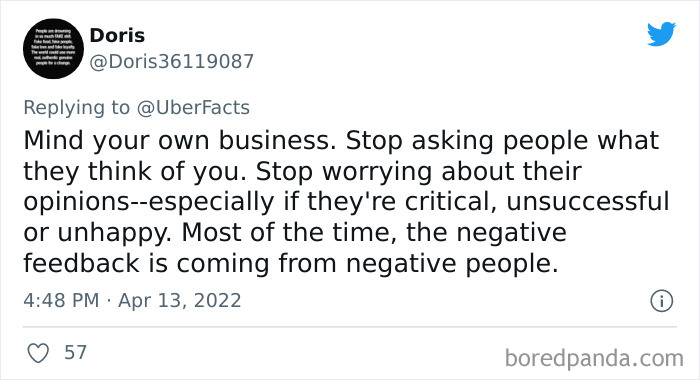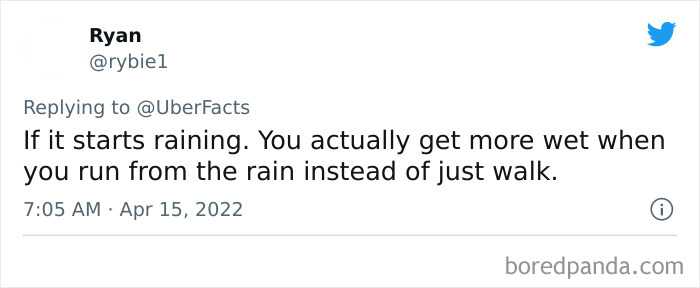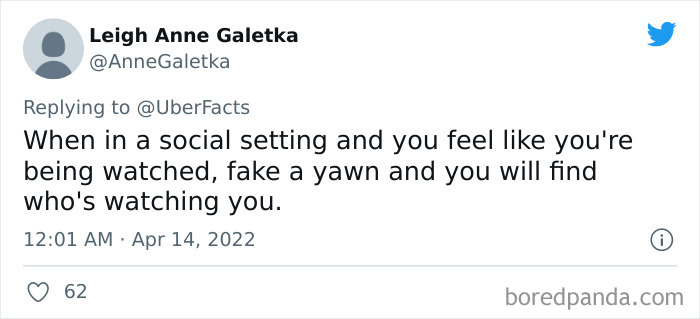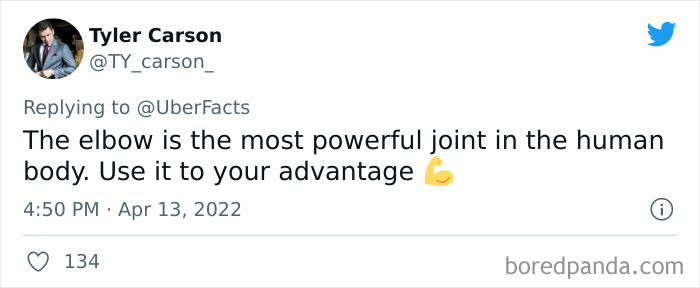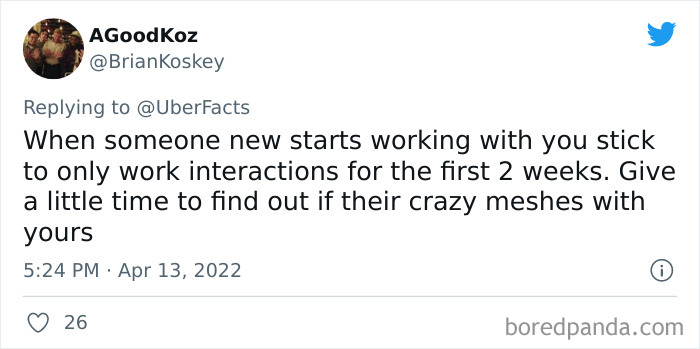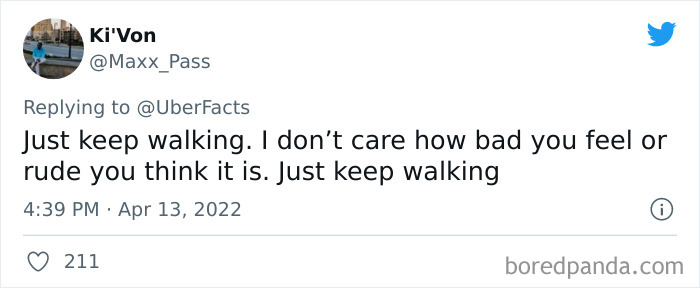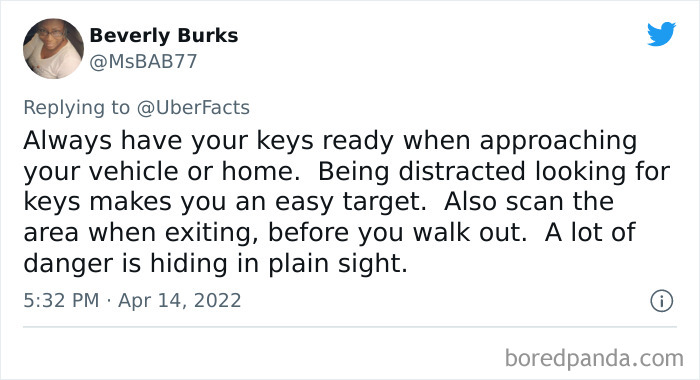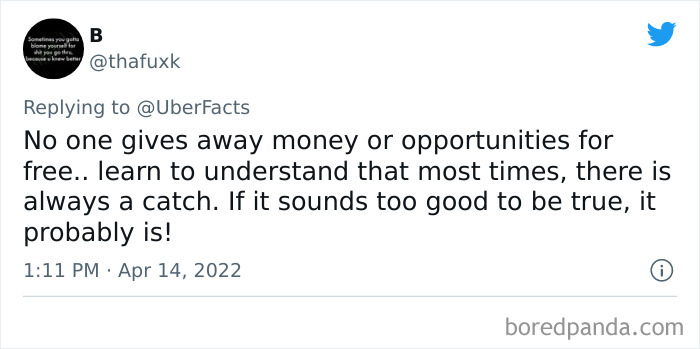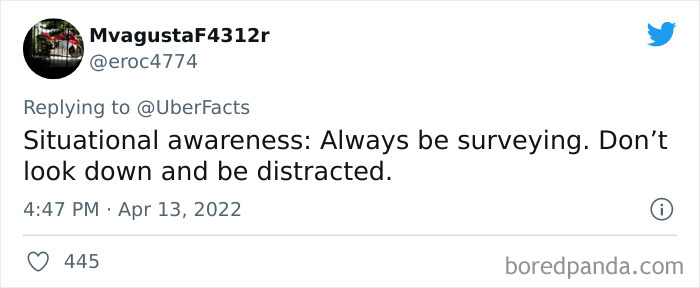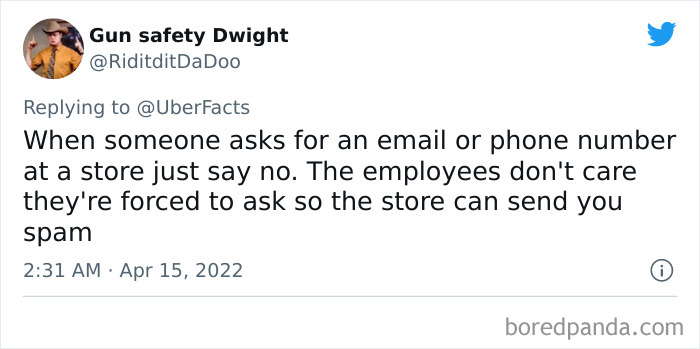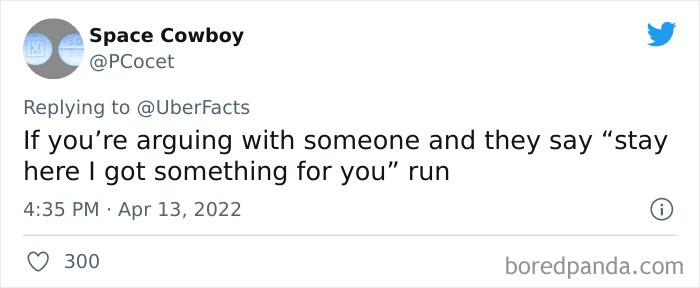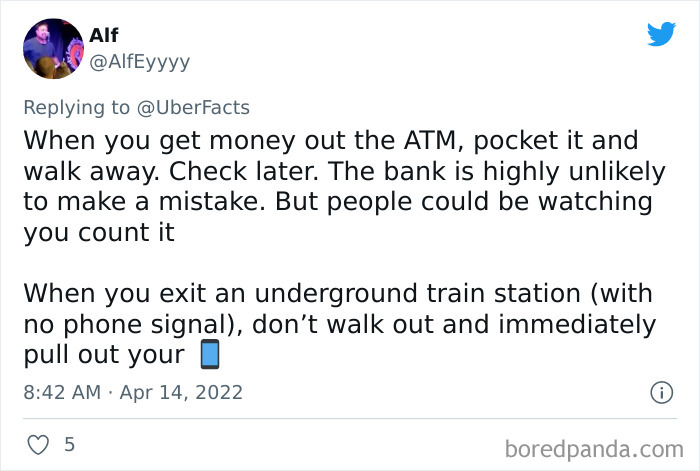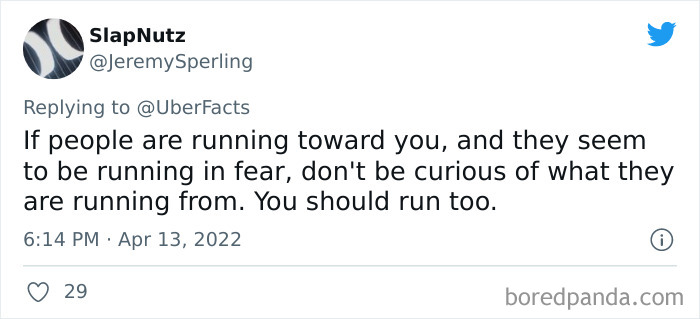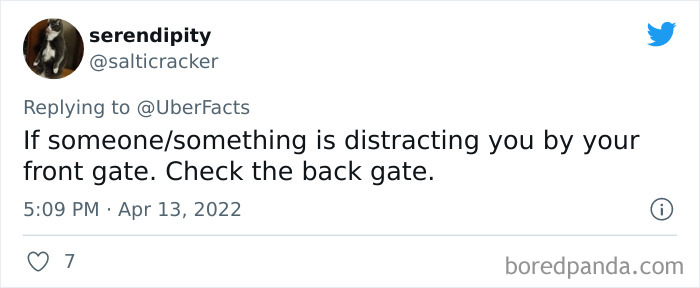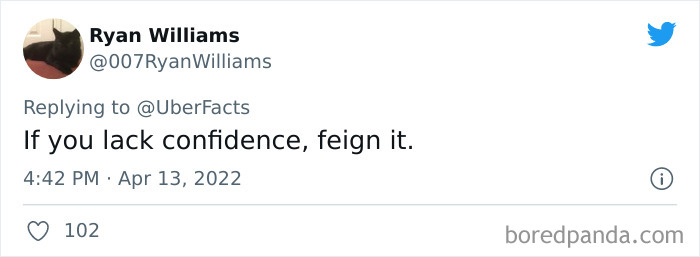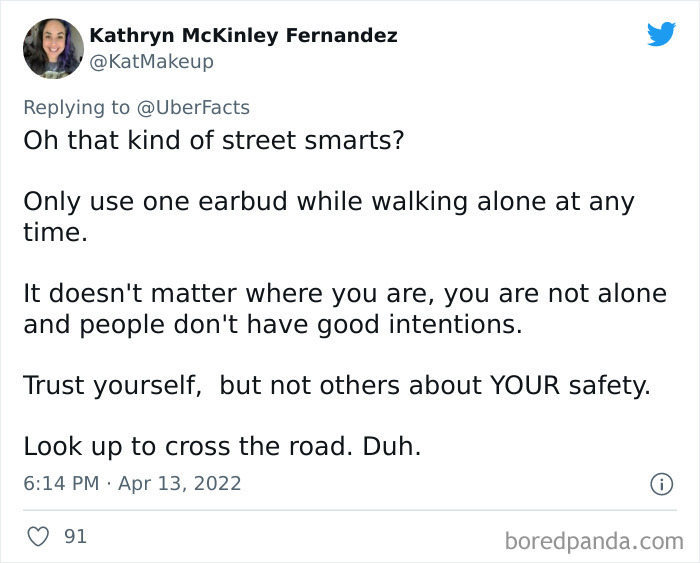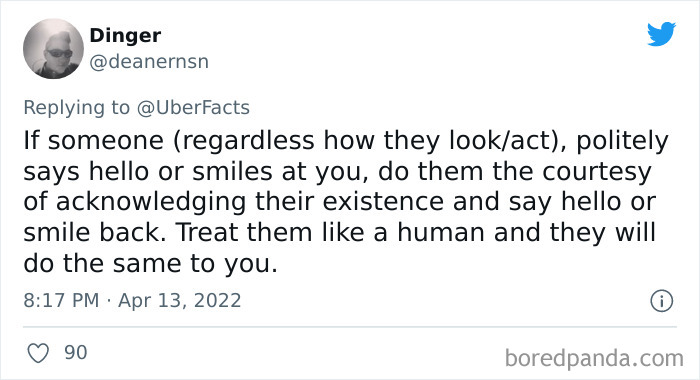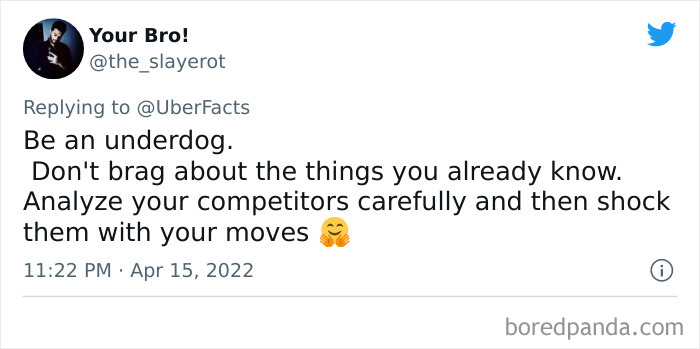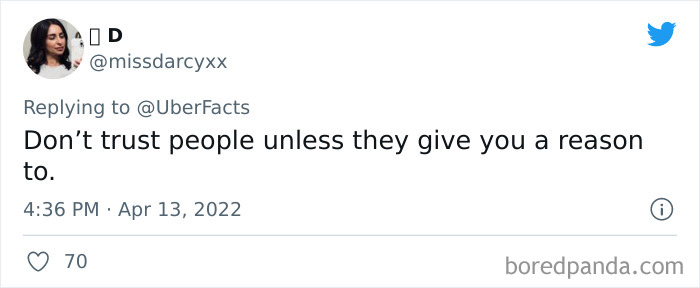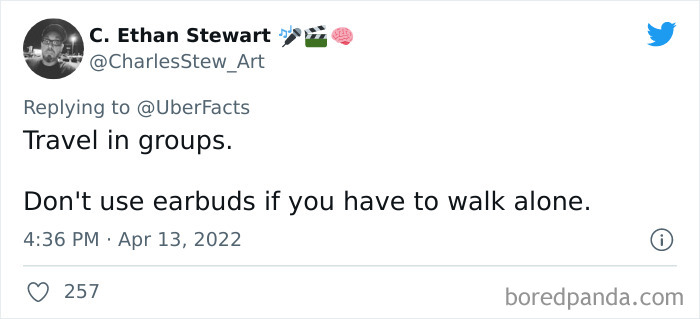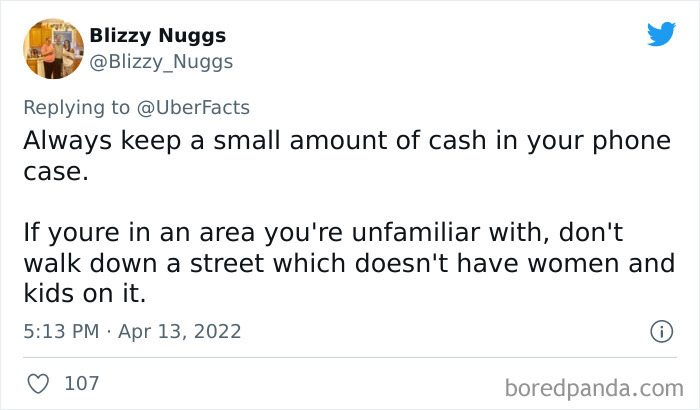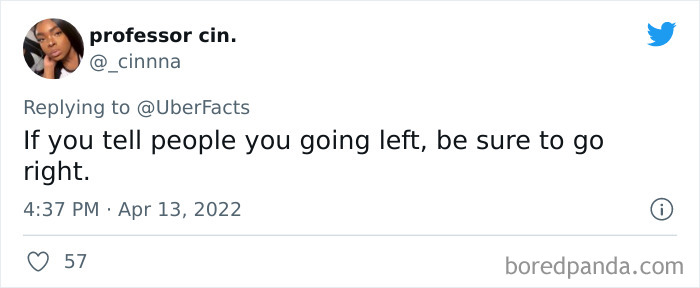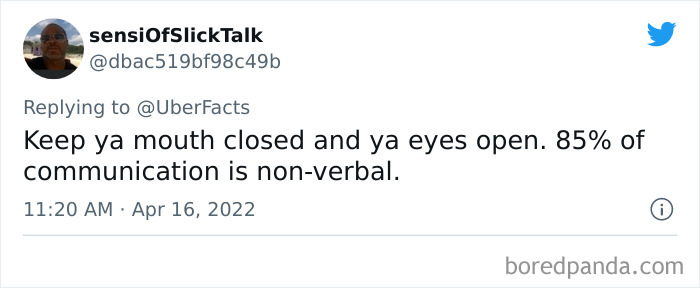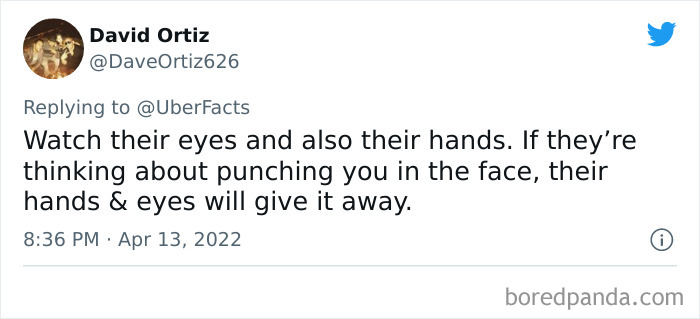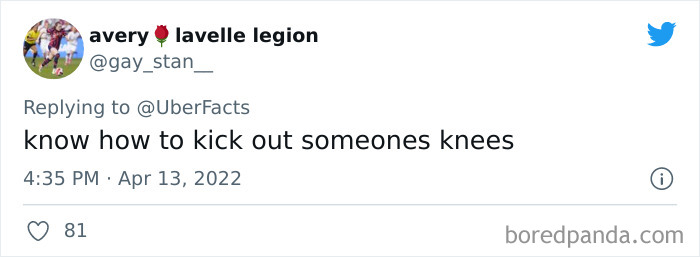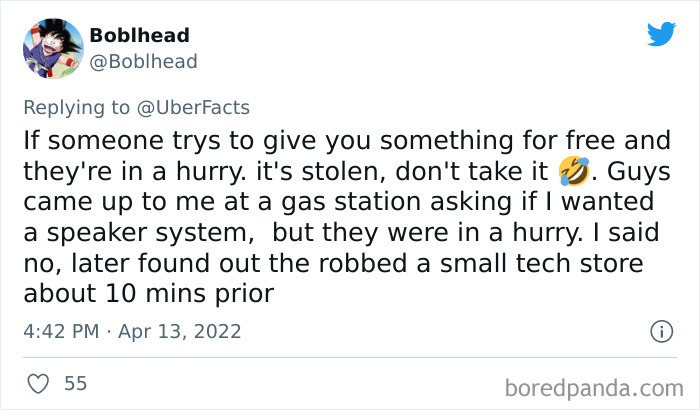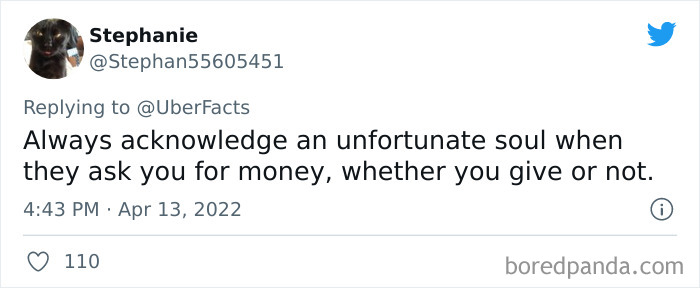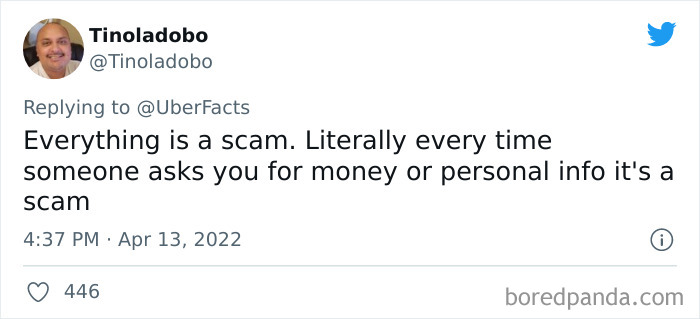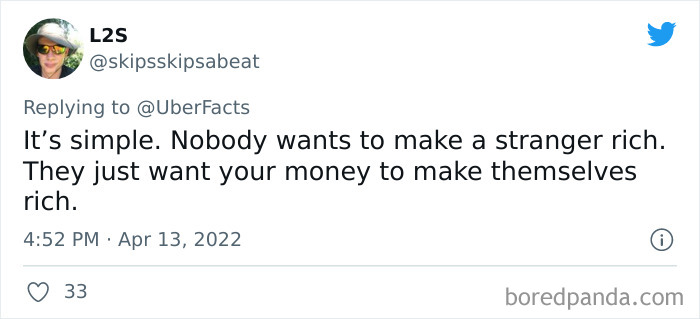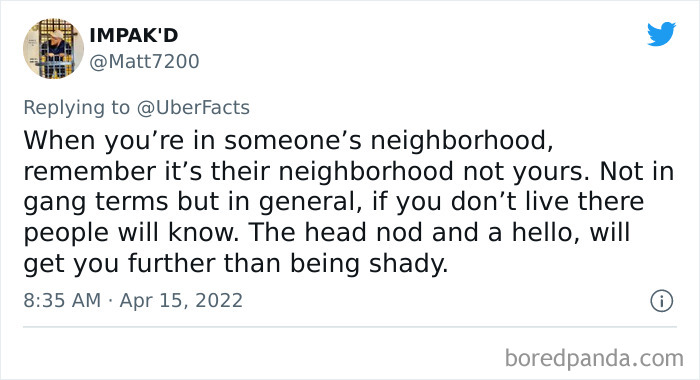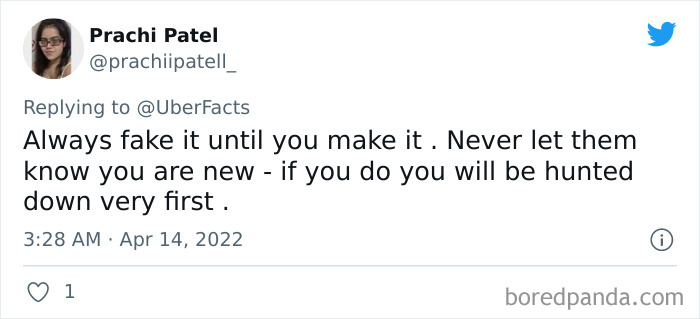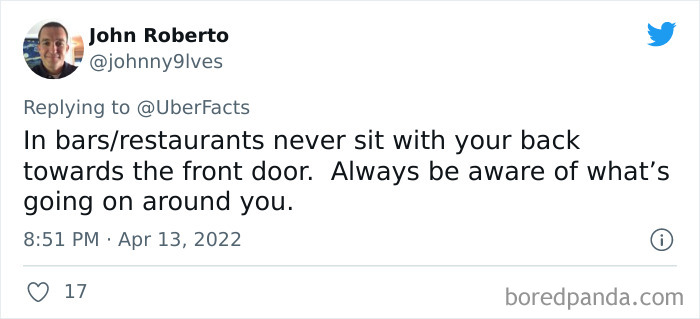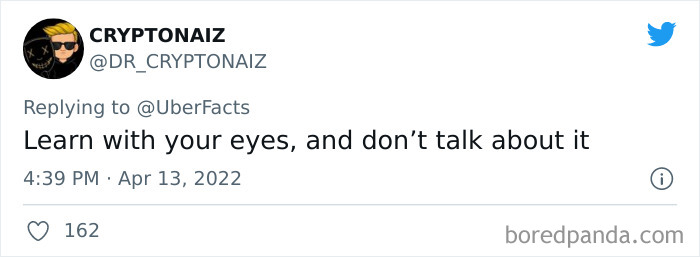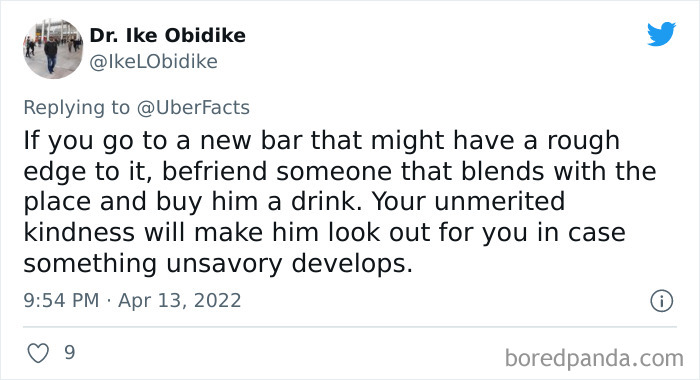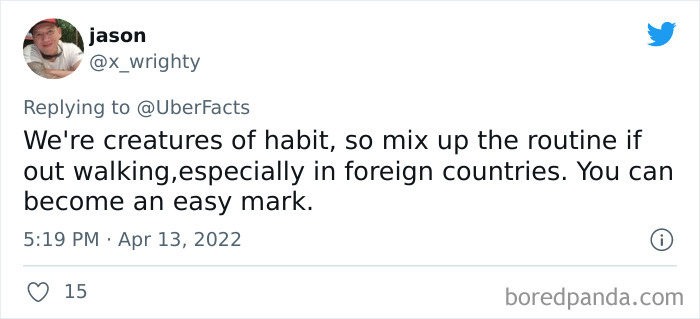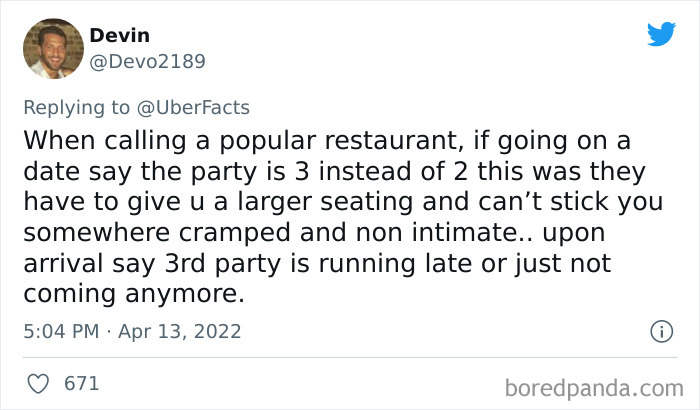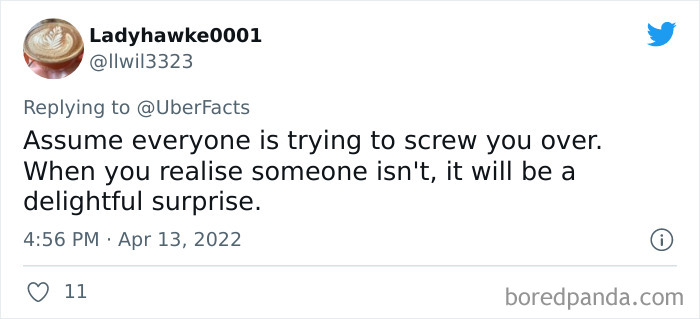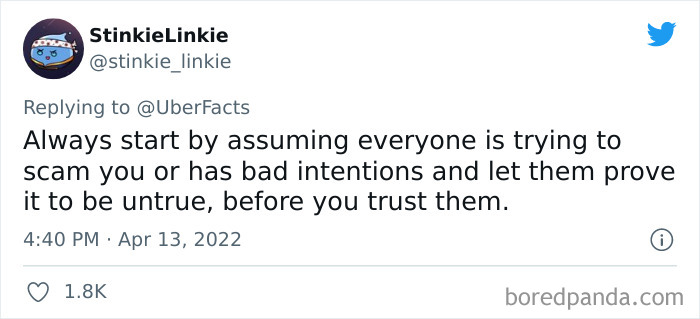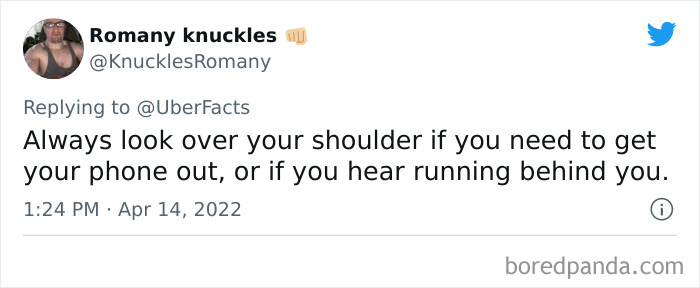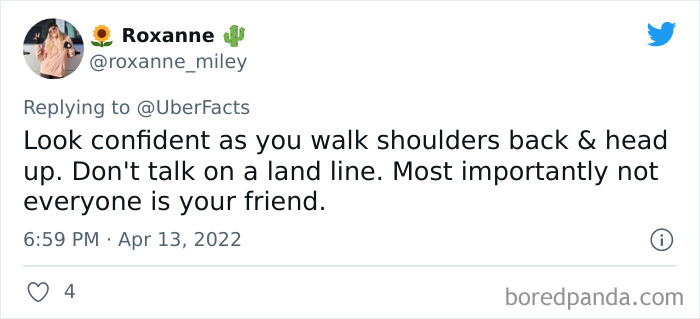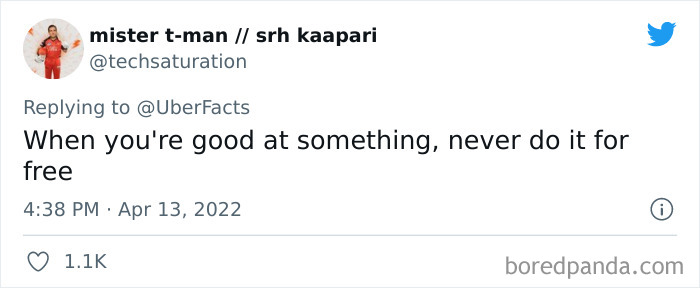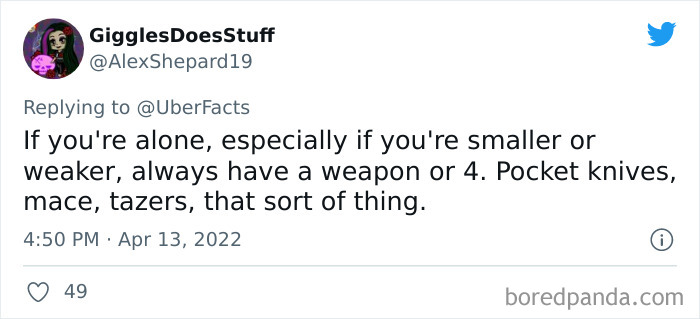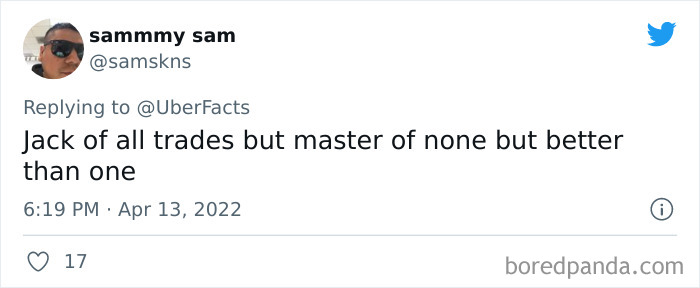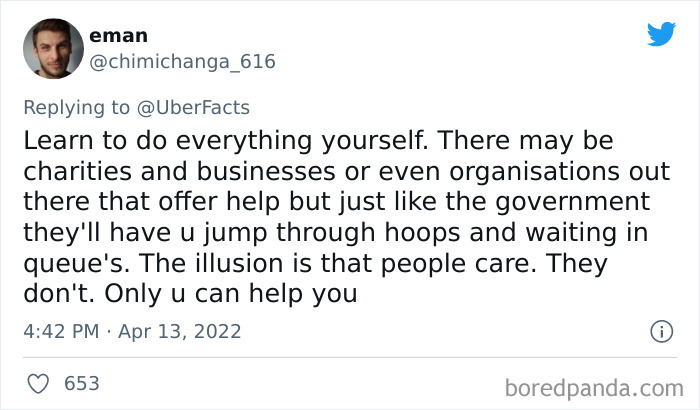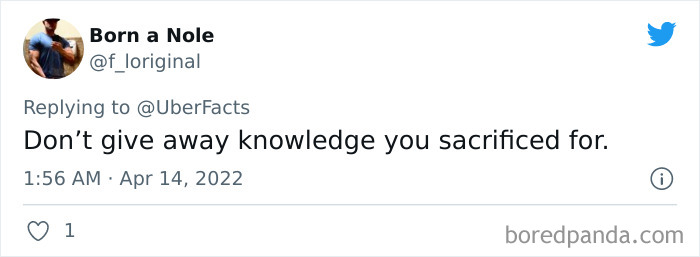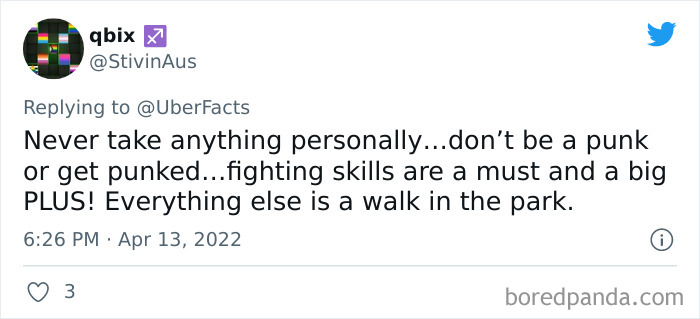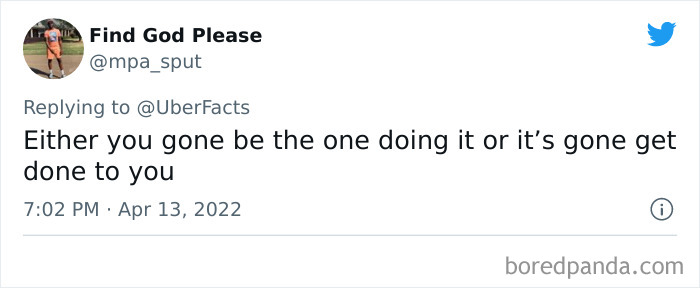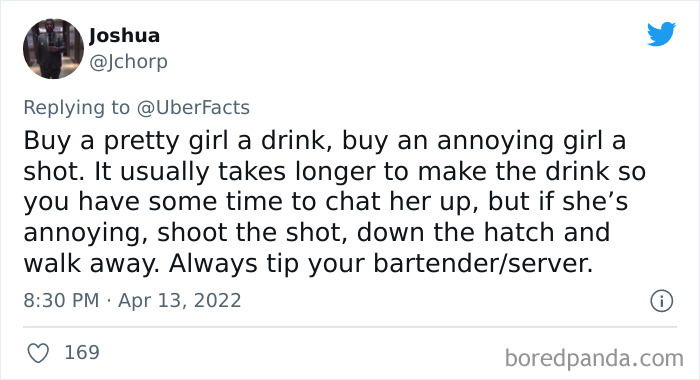When someone is street smart, it means they have a good situational understanding and awareness. In simple words, they know what is going on around them and how to navigate that environment. The way they go about it is practical, generally resulting from real-life experience.
But since we all have different backgrounds, many of us didn't even get a chance to learn these lessons. However, you never know what situation you can end up in, and knowing how to respond to danger, or simply getting the best bang for your buck, can make a huge difference to your day.
Recently, Uber Facts, an online project that shares "the most unimportant things you'll never need to know" and one that we covered in the past, tweeted a question, asking, "People with 'street smarts,' what's your biggest street tip?" and received plenty of useful replies. So we decided to compile the best ones and give you a chance to learn something new. Continue scrolling and upvote the entries you like the most.
More info: Twitter
Image credits: UberFacts
This post may include affiliate links.
This needs upvoted a bazillion times!!! Good on you and thanks for posting!
Children usually learn about their own relative smartness in school. Overwhelmingly, it is poor and/or students of color who are unjustly left feeling not good enough.
Jean Anyon discovered in her work concerning knowledge construction in schools that, "[Working class] children already 'know' that what it takes to get ahead is being smart, and that they themselves, are not [book smart]."
Additionally, Black and Latino students have been overly-represented in special education programs and gifted programs often result in re-segregating schools, where the White students attend the gifted program while students of color are tracked into 'regular' educational programming.
Black children as early as pre-school begin to be over-represented in what is perceived as "low ability" classes and/or classes for the "educable mentally retarded."
As mentioned above, assignments to these classes can be devastating to the students' self-perception and they may even begin to think of themselves as not smart.
Consequently, this can lead these students to have low achievement, a lack of motivation, and a desire to drop out of school altogether. The failures of many of these children are often attributed to their own abilities rather than their school's.
As Dr. Beth Hatt said, the youth think the symbols of smartness within schools include grades, diplomas, labels, standardized tests, and participation in college prep courses.
These things are what make smartness appear "real" rather than as something socio-culturally produced. They make smartness especially powerful because it becomes extremely difficult for students to challenge the ways it gets defined and how they are constructed as smart or not smart in school.
Simultaneously, these symbols begin to influence students' perceptions of themselves and their own abilities over time.
And 'winning' is when both parties understand each other better as a result.
Students who struggle to acquire the before-mentioned symbols of smartness are left to either perceive themselves as not smart or to reinterpret smartness.
When Dr. Hatt asked what they thought it meant to be smart, the youth responded with definitions that included learning what is being taught at school and how not to get caught by the police when selling drugs.
"However, two key themes overwhelmingly were present in their responses," Dr. Hatt said. "First, they clearly made a distinction between being book smart and street smart. Second, they refused to define smartness in a narrow way."
Because lots of cars have darkened windows, we usually use the hazard warning lights' triangle button for 2 flashes.
"At first, this appeared contradictory because the youth seemed to be simultaneously defining street smart as the ultimate form of smartness while also defining smartness in a way that allowed everyone to be defined as smart."
"Eventually, I realized that these were not necessarily contradictory definitions. Instead, they were both attempts at agency in speaking back to the narrow definition of smartness that had been imposed upon them in school and an attempt at reinterpreting their own identities," Dr. Hatt said.
When Dr. Hatt asked the youth to define smartness they were quick to define it as book smarts vs. street smarts.
Book smarts were directly connected to the symbols mentioned previously but street smarts were often defined as a direct counter to book smarts or the dominant discourse of smartness.
The following include some of the ways the youth defined street smarts:
"Able to not go into bankruptcy I guess... and stay out of trouble. Just able to survive on the street without getting into trouble, and keeping a home for yourself and everything going," Calveda.
♪ Don't be suspicious, don't be suspicious ♪ Wait- do be suspicious!
"If you can make ends meet, whether you're educated or not... like in school I was a book smart type person, but when I dropped out I had to learn the street smarts part of it. And yeah, I was 19 years old, 20 years old, and I had $30,000 and I could do anything I wanted with it, but yet it was illegal," Nickili.
"I believe I have some street smarts. Like I've never been arrested for drugs... I know not to walk around here with all these drugs on me broadcasting it. I mean, that would be stupid... I know when trouble should occur that I need to leave, and get out of that situation, or I have to handle my business, or not handle my business," Quinn.
"Street smarts were connected with being able to maneuver through the structures in their lives such as poverty, the police, street culture, and abusive 'others,'" Dr. Hatt said. "This distinction is key because street smarts stress agency in countering social structures or obstacles whereas, for many of the students, book smarts represented those structures or obstacles, particularly in their efforts of passing the GED or acquiring 'papers.'"
This begs the question, why is teaching (and, in turn, learning) so fragmented? Can't we figure out a way how to teach the young in a more inclusive manner? One that doesn't force them to choose between books and the street? But that's a topic for another time.
Not just on the street or whatever - this can apply to a lot of situations
Yeah, first it's hello back, then him "what's your name", or wevs. Then the insults fly and if you're lucky, they give up. Not all men, but enough men. So no to your post, as nice as you might be.
"You can only fool someone who thinks you are weaker than them one time" - Sabretooth
I never use my cell or ear buds when I am out or walking somewhere. I use a cane and its too enticing I think, to a criminal, if they see this! I also carry my purse cross body and am prepared to use my cane as a club or weapon.
I'd say keep cash in multiple pockets so you can hand them the cash from your front pocket and they think they've got it all, but you've got a reserve in the back, or the other side. If they're going to steal your money, they're probably going to steal your phone. That's my tip.
Also as a woman, be ready to bend a bit and grab balls. That hurts and will drop them to the ground fast. If their pants are super low and even if belted, if you tug and pull on the legs they will drop like a sack if potatoes and lose their grip on whatever weapon they have, then you can run or call the police! If you can, hold onto their pants. If they shimmy out of them and run, you got DNA AND A WALLET or something they carry thats personal!
Lol I worked at a gas station that some guy was driving around the parking lot trying to sell some speaker system I was pretty sure it was stolen....same guy? Lmao
Nah. I don't think my Nigerian prince will betray me like that.
I was delivering Christmas gifts in a bad section of Orlando and was stopped my some very nicely dressed men coming home from church who were concerned for my safety. I explained my task, and they took me there, stayed on the porch, and made sure I got out of the neighborhood safely. Very nice men in a very scary neighborhood that I had no idea existed.
This! This right here is so annoying. You've obviously never went to dinner with 8 guys who all insisted they sit in that spot. So. Fripping. Annoying. No, Kevin, Donald, Goofy, Bobby, Dylan, etc. you are not a character in some novel. Your a pretentious jerk who wants everyone to believe that you secretly live a dangerous life when the most dangerous thing you do is let Grandma drive you to church on Sunday.
If you go to a bar alone and it feels "rough", don't drink alcohol there. Leave.
So we are betting on foreigners tracking our movements in the first place?
Yeah, go ahead and trick the little independent restaurant into giving you a four cover table when you only need two. In fact, why not go the whole hog and book the entire restaurant out so you and Briony can have a little intimate time without all the NPCs crowding you out?
Met people like this. I'm a give for free anything your willing to do without. There is a lot of stuff/time I just don't care about. Like, it's nothing for me to give you 10 mins to vent or empathy if you need to tell a stranger about the recent death in the family. Want my unopened snack food, sure here. I'm going to be ok until the next meal anyway, you might not. I don't give money though. That feels like I'm being scammed. Coworker complaining about having to work this weekend and I'm not doing anything special, I'll work it and expect a polite thanks in return. Nothing else. I don't hold it over your head or demand anything tangible in return.
My boyfriend was an Army Ranger and spent 20 years in combat, he is now a State Police Lieutenant for Illinois usually assigned to the worst areas of Chicago. We both grew up together in Cicero, IL in the 70's and 80's which is rather notorious on it's own. Trust me- go with the or 4- be in the habit of carrying multiple items to defend yourself. I have at all times a pocket knife, pepper spray on my keys and in my jacket pocket and a concealed carry license. If for whatever reason those things don't work for you- go to the boat store and get yourself an emergency flare gun- I keep one in my car. Virtually no problems with legality and no one is going to mess with you once they realize they have a good chance of being hit with a flaming bar of potassium nitrate that will melt their clothes into their skin. Gruesome I know, but there are some very bad people in the world, protect yourselves.
What if you want to spare someone else from having to make the sacrifice that you made?
Some of these are actually laughable. "Fighting skills are a must..." Surely the ability to avoid fights is more rewarding
If you are old enough to drink you are no longer a girl but a woman and don’t accept drinks from strangers.
It seems like most of this advice isn't good advice. I mean what's with the not trusting anyone? I've got trust issues and I think that's overkill. I know there are people you can't trust in life, but that doesn't mean you just don't trust anybody at all. There are good people in this world.
A long time ago I decided that I would rather go through life trusting people, and occasionally getting hurt, than live assuming the worst of everyone. I get burned, but I think it's a better way to live. I have also helped a ton of people. *Obviously this does not apply for women in bar situations or alleyways. I'm sorry the world is shitty enough that the asterisk is needed.
People who are ‘overly paranoid’, what’s your biggest paranoia tip?
It seems like most of this advice isn't good advice. I mean what's with the not trusting anyone? I've got trust issues and I think that's overkill. I know there are people you can't trust in life, but that doesn't mean you just don't trust anybody at all. There are good people in this world.
A long time ago I decided that I would rather go through life trusting people, and occasionally getting hurt, than live assuming the worst of everyone. I get burned, but I think it's a better way to live. I have also helped a ton of people. *Obviously this does not apply for women in bar situations or alleyways. I'm sorry the world is shitty enough that the asterisk is needed.
People who are ‘overly paranoid’, what’s your biggest paranoia tip?

 Dark Mode
Dark Mode 

 No fees, cancel anytime
No fees, cancel anytime 






